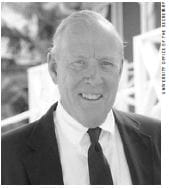Early in his career, Paul Miller got a first-hand lesson in what became his greatest motivating principle.
“I had worked at the Federal Reserve Bank and then decided to go into the investment management business, ending up at Drexel and Company,” said Miller. “It was a blue-blood, white-shoe firm, and I was definitely not from Philadelphia society, so I was not really optimistic about my future success there. So it was to my great surprise when they made me a partner at age 29,” said Miller, a Trustee Emeritus of the University and a former Board of Trustees chair. “I am a great believer in meritocracy.”
While Miller spent the rest of his working life in managing money – first at Drexel and then at his own firm, Miller, Anderson & Sherrerd – his life was never entirely subsumed by his work. At 39, he became a trustee of the University and served on the board for the next 31 years, eight as board chair. In September 2007, his grandson, Jake Merrill, entered the University as a Wharton freshman, becoming the fourth generation of the family to attend Penn.
He has also been on the board of such diverse organizations as the World Wildlife Fund, the Ford Foundation, the Colonial Williamsburg Foundation, and the Pew Charitable Trusts, and has been elected a member of the American Philosophical Society.
“I found that in the investment management business, unless you have ties with the real world out there, you tend to be unrealistic in your approach. It is not just looking at annual and quarterly reports,” said Miller. He said he was not only proud to be a member of eight different corporate boards of directors–including Rohm and Haas, Hewlett Packard, and the Mead Paper Company – but found it enlightening and, ultimately, necessary for his business education. “They gave me the view of the realism of the world, not just the statistics of those annual reports.”
Miller’s firm was sold to Morgan Stanley, and he retired in 1996. Writing his memoirs helped him clarify his principles. Miller has set down his views in his memoirs, nearly 300 pages of them. He said he is old-fashioned in some ways and progressive in others. “I can be frank to a fault, especially in the parts of the memoirs that are of things I am now past doing,” he said. “But they also go into my views on life – of religion and politics and philosophy.”
“I am not a religious person. I’m an atheist or an agnostic, depending on what day you catch me,” he said. “But I do believe in some eternal truths.”
“I believe in hard work and earning your way, which I guess is nothing unusual,” he said. “I believe that in business, having a piece of the action lends people to doing better work. Early on in our firm, we made young people into partners. I think we had 24 of them at one point. I believe in splitting the pie with people who are dedicated.” “But more than anything, I believe that success is living up to one’s potential,” Miller continued. “It is not about money, but finding out what your potential is and striving for it. If you don’t do that, then you are inevitably going to be unhappy.”

























